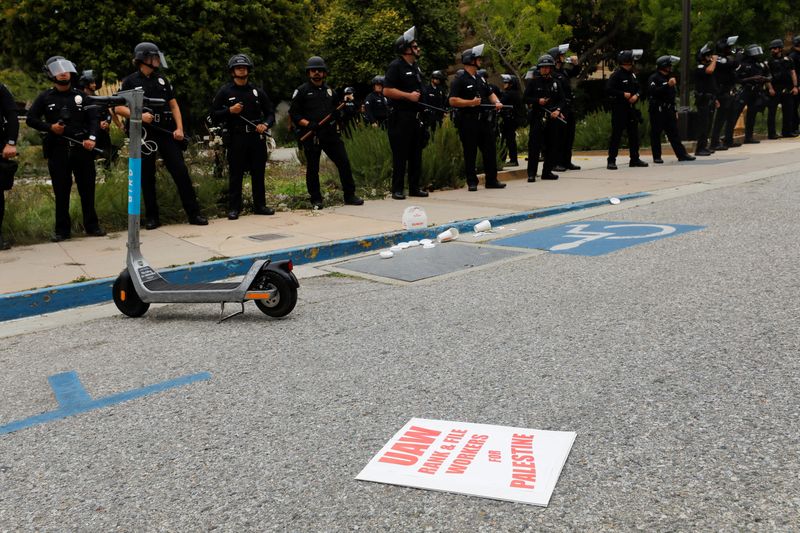By Steve Gorman and Andrew Hay
LOS ANGELES (Reuters) -Three weeks after a mob attacked pro-Palestinian activists encamped at the University of California, Los Angeles, police have made their first arrest in the violence, a man they say was seen in video footage beating victims with a wooden pole.
The suspect, identified as Edan On, 18, was taken into custody on Thursday in the city of Beverly Hills and booked on suspicion of assault with a deadly weapon, the UCLA Police Department said in a statement on Friday.
The man, who police said had no affiliation with UCLA, was reported by local media to be a Beverly Hills High School student.
His arrest was the first by police in their investigation of violence that flared on campus between pro-Palestinian activists occupying a tent camp to protest Israel's war in Gaza, and a group who attacked them late on the night of April 30.
The masked assailants, described by university officials and police as "instigators," stormed the protest site with clubs and poles, sparking a pitched skirmish in which both sides traded blows and doused each other with pepper spray. The encampment occupants said fireworks were also hurled at them.
The confrontation dragged on for at least three hours into the early morning of May 1 before order was restored. Police forcibly dismantled the encampment the next night, arresting 210 people.
The two days of disturbances thrust UCLA to the center of mounting tensions on dozens of U.S. college campuses between pro-Palestinian and pro-Israel activists, with the two sides trading accusations of antisemitism and Islamophobia.
The police response to the UCLA unrest was widely criticized as slow and feeble when the pro-Palestinian encampment was attacked and denounced by some as comparatively heavy-handed when the tents were torn down 24 hours later.
Earlier this week, UCLA's police chief, John Thomas, was removed from his post pending an outside review of campus security and public safety protocols, university officials said.
No group took responsibility for the April 30 attack. But the UCLA chapter of the Jewish campus organization Hillel said in a statement that the mob was comprised of "fringe members of the off-campus Jewish community."
UCLA Chancellor Gene Block, testifying Thursday before a U.S. congressional hearing into the protests, said his school should have been prepared to immediately remove the protest encampment "if and when the safety of our community was put at risk."
The violence took place two days after a pro-Israel group, the Israeli American Council, held a rally next to the UCLA encampment, with the council's leader, Elan Carr, urging his supporters to “take back our campuses" from pro-Palestinian protesters. Scuffles broke out between the two sides.
“It really significantly escalated tensions on the campus and around the encampment,” said Dov Waxman, professor of Israeli Studies at UCLA, who tried to keep the opposing sides separate on April 28.

In an interview, Carr denied trying to incite violence at UCLA but defended his denunciations of the pro-Palestinian protesters for what he said was their support of Hamas.
“These campus groups have made themselves aiders and abettors of some of the worst human rights violators in the world,” said Carr, a former U.S. Army officer who was former President Donald Trump’s special envoy to combat antisemitism.